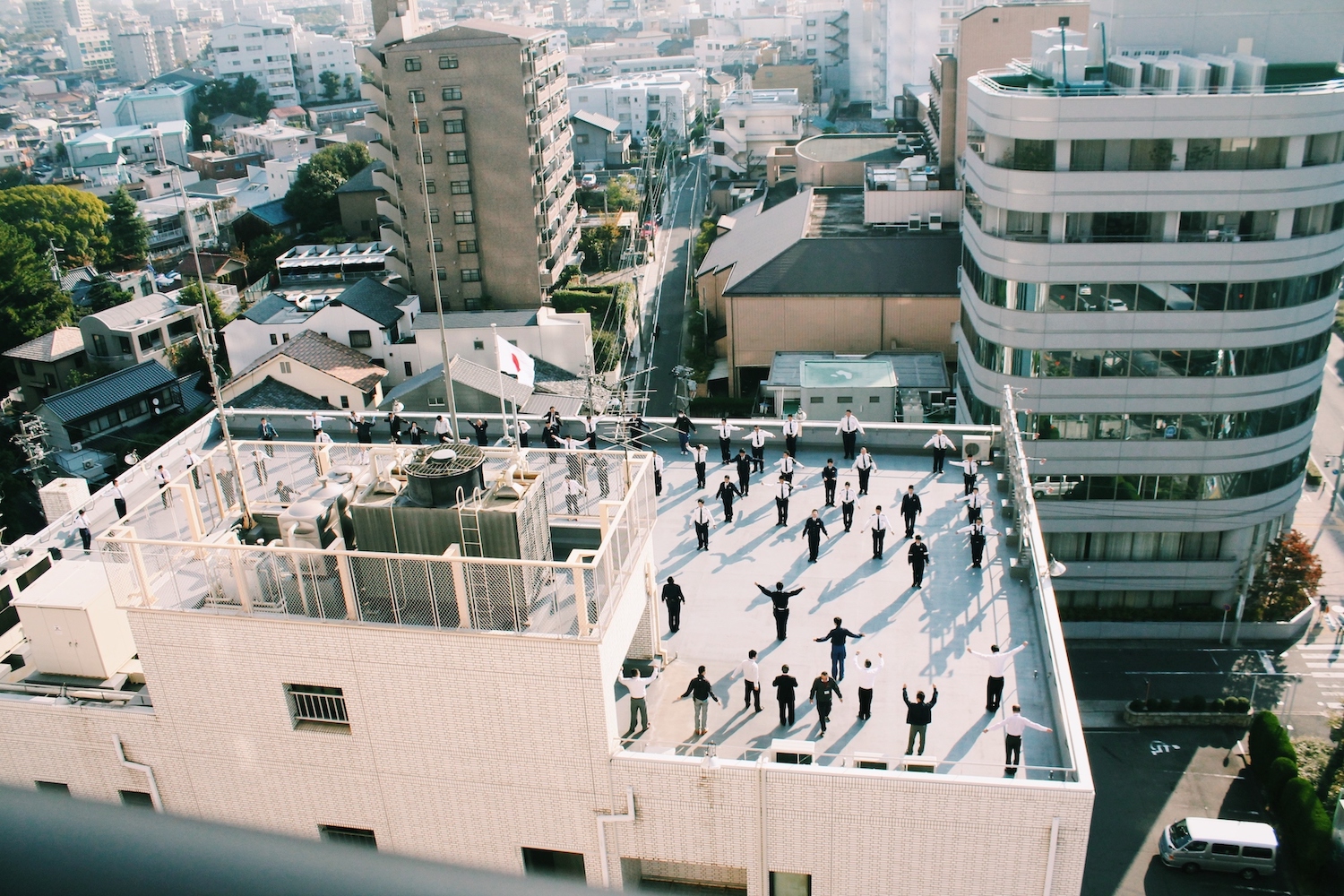Sharing how I got paid to live in Japan by teaching ESL plus the benefits and challenges I experienced. Find out if teaching in Japan is right for you.
One of the easiest ways to get paid to live in Japan is by teaching English.
Teaching ESL (English as a Second Language) in Japan is probably the most common job foreigners have in the Land of the Rising Sun, and there are countless opportunities to do so.

Moving to teach English in Japan was the first step in my journey around the world and the one opportunity that qualified me for future jobs that would lead me to work and travel through all seven continents and seven seas.
Related: 7 Continents & 7 Seas: How I Got Paid to Travel the World
I was extremely lucky with the company I ended up working for due to the school and location I was given.
While I didn’t agree with everything my company was doing or requiring of the teachers, it was the best fit for me and my goals while I was in Japan.
Depending on your objectives (short-term or long-term, a transition phase or a teaching career), some positions or types of teaching opportunities may be better for you than others.
There are many, many stories of teachers who had a terrible experience (just Google “teaching English in Japan horror stories”) but I think it’s important to remember that not every program, company, branch, or school is the same.
I had my fair share of frustrations, but I think that can be expected of any job, especially one in another country.
This is all to say that while teaching is a great opportunity if you’re looking to get paid to live in Japan and travel the country, it is still a job with ups and downs.
[joli-toc]
Is Teaching English in Japan Right For You?
If you’re considering teaching in Japan, I’d just recommend that like everything else in life, you should do your research and understand that one person’s good or bad experience may not apply to the company or school as a whole.
That being said though, the truth is that teaching honestly isn’t for everyone. And neither is moving to a foreign country for a year.
But I think if you have the right mindset, jump in with an open mind, have a willingness to be humbled and to learn from another culture, and—if you’re lucky— surround yourself with good people and make meaningful connections, teaching in Japan could be a rewarding experience.
Related: Moving to Japan: What to Bring to Teach English

ALT vs Eikaiwa: What’s the Difference?
There are two general paths to teaching in Japan, either as an assistant language teacher (ALT) or at an eikaiwa (conversational school).
ALT (Assistant Language Teacher)
As an ALT, you primarily work in Japanese schools with kids ranging from elementary to high school.
The class size can be upwards of 30-40 students.
Because the job location is at a school, your working hours will also be typical school hours during the weekdays.
Also, as the title implies, you assist a Japanese English teacher in the classroom so you’re not flying solo.
The most popular ALT pathway is through the Japan Exchange and Teaching (JET) Program.
The highly competitive program is sponsored by the government with the goal of cultivating international relationships within local communities.
Since most of the demand for ALTs with JET are not in large cities, but rather smaller towns or villages, JET participants are placed in less touristy areas and end up with a more immersive cultural experience.
Eikaiwa (English Conversational School)
An eikaiwa is an English conversation school that offers paid lessons for students of all ages.
The class sizes are small, from one-on-one private lessons to maybe a maximum of 10 or so students.
Depending on the eikaiwa and/or school branch, teachers may only have kids or adults, or a combination of both.
Work days and hours are irregular since the classes are usually attended after school or regular work hours, or on Saturday (the busiest).
I worked for AEON in Japan, one of the larger eikaiwa companies, and our work week was Tuesday to Saturday from 12 p.m.-9 p.m. (11 a.m.-8 p.m. on Saturdays) with the occasional half-day on Sundays once a month or so.
Related: My Experience Teaching in Japan with AEON
There are more chances to live and work near or in a larger city as an eikaiwa teacher, but the consensus seems to be that you work much more than an ALT and have more obligations in general when it comes to teaching.

Benefits of Teaching in Japan
TEFL/TESOL Certification is Not Always Required
While it certainly helps, many of the main conversation schools will hire teachers without certification.
This was a huge advantage for me as I had teaching experience but no TEFL/TESOL certification or the money to pay for a course at the time.
However, if you’re looking to teach at a university level and/or have a more sustainable career in teaching with better pay, you will need all the necessary certifications.
Schools or companies that don’t require certification are often just a means to get a foot into Japan before finding something better and serve as an easy way to spend a year or two abroad.
Visa Sponsorship
Most schools and companies will take care of this for you, which makes getting your long term visa so much easier than if you tried to do it alone without a company or organization to support you.
Three Week-Long Vacations a Year
Three times a year, Japan observes extended, week-long holidays: New Year’s, Golden Week (end of April-ish), and Obon (mid-August).
Schools take a break, which means so do you.
While you still have additional days off to spread out throughout the year, these three weeks are prime travel opportunities for seeing the rest of the country or venturing out to neighboring Asian countries.

Make International Connections
This will vary depending on who you’re teaching (kids or adults) and how well you get along with the staff in your school, but I found that the adults I taught and the people I worked with became my first friends.
It wasn’t hard to expand my social circle or make friends since they would invite me to meals, parties, and events.
Even today, several years after I’ve left the country, I still keep in touch with a few of these special individuals.
Experience Japan Immersively
It’s one thing to visit Japan as a tourist on a two-week vacation, but experiencing it for a year or longer definitely offers a different perspective and appreciation for the country and culture.
It also gives you time to see more than just the touristy places and immerse yourself in local life.

Professional Growth
Teaching in a foreign country provides you with a unique set of skills that can make you a better employment candidate in the future.
From learning how to navigate everyday life in a place where you don’t speak the language to working in a different cultural setting, teaching in Japan can prepare you for both a career teaching ESL or professional life abroad.
Personally, teaching in Japan allowed me to learn and acquire the necessary skills in order to teach on a cruise ship that sailed around the world.
Related: How I Cruised Around the World for Free with Peace Boat

And that opportunity would eventually lead me to work full time on commercial cruise ships, which then led me to working and living in Antarctica.
I truly believe that every career step just sets you up for the next, and my journey around the world is exactly that— all because of the skills I first picked up from teaching in Japan.
Related: How I Got Paid to Live in Antarctica: FAQ About Working on the Ice
Challenges of Teaching in Japan
It obviously goes without saying that everyone will encounter different obstacles while teaching or simply living in Japan as an expat.
Here were some of the challenges I found to be difficult for me.
Adjusting to Working in a Japanese Environment
While this was to be expected, I found this to be a big challenge for me even though I am partially Japanese and knew what I was getting myself into.
I had a hard time doing just as I was told without any extra information.
It was brought to my attention that questioning why we were doing things a certain way or simply asking “why” when I was told to do something that didn’t make sense to me was not welcomed.
This is of course part of learning how to live in a different culture, but there were definitely times where I felt a little piece of my soul was dying as I slowly became an agreeable robot.

Your English Gets Worse
After using simplified, classroom English in Japan for two years, I found that my natural speech and communication warped into some weird and broken pattern that is uniquely the language of Japanese ESL teachers.
This featured horribly placed inflections, over-enunciating and overemphasizing question words, and terrible phrasing no sane fluent speaker would ever use.
My English was honestly trash after I left Japan and there were times I’d question my own English.
You’ve been warned.
Becoming Part Teacher, Part Therapist
Preface: these next two will probably only apply to those who work in an eikaiwa.
Since most of my students were adults and I had a fair amount of private lessons, I became easily overwhelmed by things my students would innocently share with me.
While I had structured lessons and discussion topics for us to use in the lesson, it was kind of hard to go from greeting a student with “How are you today?” to jumping into the lesson when they’d respond by telling you they’re going through a divorce or having problems at work.
My job was of course to teach, but as a person whose time had been bought for a one-on-one hour-long session, I wasn’t going to tell them I didn’t want to hear about their issues, especially when they were trying so hard to explain everything using English.

It was also odd because it was a very one-way relationship, much like a therapist and client.
My students would talk freely about whatever was on their mind and I had to keep up a professional wall, no matter how bad of a day I was having.
There were days I felt exhausted and burdened, but I had to learn how to leave all the mental baggage at work and disconnect at the end of the day.
While this was one of the most difficult aspects of my job, it was also rewarding as well seeing my students being able to put into another language what they were feeling.
I just wish someone would’ve prepared me ahead of time.
Private Lessons and Being a Foreign Woman
All of my private lessons fell in one of two categories: the highlight of my day, or the one lesson I would dread from the moment I woke up in the morning.
I will say all in all, the majority of the students who booked me for private lessons were amazing people across a spectrum of professions who I deeply respected and enjoyed teaching.
On the other hand, as a woman, private lessons with certain men just felt…shady at best.
It’s not uncommon for Japanese men to request a private lesson with a specific female foreign teacher.
It’s not fun, but you also can’t really say no if there’s no reason other than the student is a little weird or creepy.

Luckily, although I was the female foreign teacher in my branch, I’m also Asian American.
I think this removed me from being fetishized like other western women from the typical socially awkward Japanese men who preferred to book regular private lessons with foreign female teachers.
Unfortunately, sexual harassment is part of life in Japan for most foreign female teachers and complaints aren’t taken seriously by many companies.
I’d heard some pretty awful stories from other female teachers and I was just thankful all the men who had booked me never got past creepy or into harassment territory.
The worst I got were men who were pretty quiet and honestly, it seemed like they just wanted to stare at me and have female company feigning interest in them.
Is Teaching in Japan Worth It?
For me, moving to Japan to teach gave me the experience and skills needed for future work-while-travel opportunities.
There are pros and cons to the different types of schools you can work at, so finding the right one that works best for you, your goals, and the type of lifestyle you hope to have in Japan is a crucial factor in whether or not the experience will be worth it for you.
If you want to live in Japan and experience it more in-depth than you would as a tourist, teaching in Japan is one of the best opportunities available.
Pin for Future Adventures!






Leave a reply